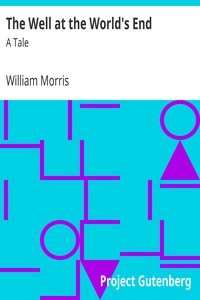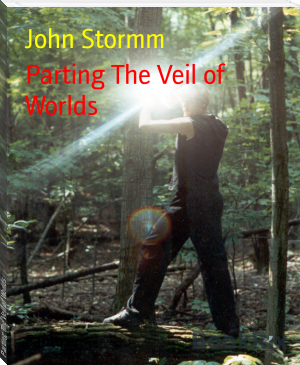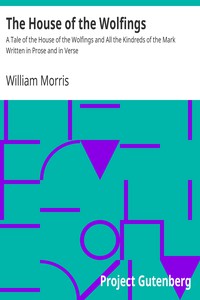The Well at the World's End: A Tale, William Morris [rainbow fish read aloud TXT] 📗

- Author: William Morris
Book online «The Well at the World's End: A Tale, William Morris [rainbow fish read aloud TXT] 📗». Author William Morris
And now was the whole Fellowship assembled, and stood in a ring round about Ralph and Bull, and the dead man; as for him, he had been dead some time, many days belike; but in that high and clear cold air, his carcase, whistled by the wind, had dried rather than rotted, and his face was clear to be seen with its great hooked nose and long black hair: and his skull was cloven.
Now Bull had done his wailing for his kinsman, and he seemed to wake up as from a dream, and looked about the ring of men and spake: "Here is a great to do, my masters! What will ye with me? Have ye heard, or is it your custom, that when a man cometh on the dead corpse of his brother, his own mother's son, he turneth it over with his foot, as if it were the carcase of a dog, and so goeth on his way? This I ask, that albeit I be but a war-taken thrall, I be suffered to lay my brother in earth and heap a howe over him in these mountains."
They all murmured a yeasay to this save Ralph. He had been sobered by his fall, and was standing up now betwixt Clement and the captain, who had unbound his hands, now that the others had come up; he hung his head, and was ashamed of his fury by seeming. But when Bull had spoken, and the others had answered, Ralph said to Bull, wrathfully still, but like a man in his wits: "Why didst thou say that thou wouldest slay her?" "Hast thou found her?" said Bull. "Nay," quoth Ralph, sullenly. "Well, then," said Bull, "when thou dost find her, we will speak of it." Said Ralph: "Why didst thou say that she hath slain him?" "I was put out of my wits by the sight of him dead," said Bull; "But now I say mayhappen she hath slain him."
"And mayhappen not," said Clement; "look here to the cleaving of his skull right through this iron headpiece, which he will have bought at Cheaping Knowe (for I have seen suchlike in the armourers' booth there): it must have taken a strong man to do this."
"Yea," quoth the captain, "and a big sword to boot: this is the stroke of a strong man wielding a good weapon."
Said Bull: "Well, and will my master bid me forego vengeance for my brother's slaying, or that I bear him to purse? Then let him slay me now, for I am his thrall." Said Ralph: "Thou shalt do as thou wilt herein, and I also will do as I will. For if she slew him, the taking of her captive should be set against the slaying." "That is but right," said the captain; "but Sir Ralph, I bid thee take the word of an old man-at-arms for it, that she slew him not; neither she, nor any other woman."
Said Clement: "Well, let all this be. But tell me, lord Ralph, what thou wouldst do, since now thou art come to thyself again?" Said Ralph: "I would seek the wilderness hereabout, if perchance the damsel be thrust into some cleft or cavern, alive or dead."
"Well," said Clement, "this is my rede. Since Bull Shockhead would bury his brother, and lord Ralph would seek the damsel, and whereas there is water anigh, and the sun is well nigh set, let us pitch our tents and abide here till morning, and let night bring counsel unto some of us. How say ye, fellows?"
None naysaid it, and they fell to pitching the tents, and lighting the cooking-fires; but Bull at once betook him to digging a grave for his brother, whilst Ralph with the captain and four others went and sought all about the place, and looked into all clefts of rocks, and found not the maiden, nor any token of her. They were long about it, and when they were come back again, and it was night, though the moon shone out, there was Bull Shockhead standing by the howe of his brother Bull Nosy, which was heaped up high over the place where they had found him.
So when Bull saw him, he turned to him and said: "King's son, I have done what needs was for this present. Now, wilt thou slay me for my fault, or shall I be thy man again, and serve thee truly unless the blood feud come between us?" Said Ralph: "Thou shalt serve me truly, and help me to find him who hath slain thy brother, and carried off the damsel; for even thus it hath been done meseemeth, since about here we have seen no signs of her alive or dead. But to-morrow we shall seek wider ere I ride on my way." "Yea," said Bull, "and I will be one in the search."
So then they gat them to their sleeping-berths, and Ralph, contrary to his wont, lay long awake, pondering these things; till at last he said to himself that this woman, whom he called Dorothea, was certainly alive, and wotted that he was seeking her. And then it seemed to him that he could behold her through the darkness of night, clad in the green flowered gown as he had first seen her, and she bewailing her captivity and the long tarrying of the deliverer as she went to and fro in a great chamber builded of marble and done about with gold and bright colours: and or ever he slept, he deemed this to be a vision of what then was, rather than a memory of what had been; and it was sweet to his very soul.
CHAPTER 27 Clement Tells of Goldburg
Now when it was morning he rose early and roused Bull and the captain, and they searched in divers places where they had not been the night before, and even a good way back about the road they had ridden yesterday, but found no tidings. And Ralph said to himself that this was naught but what he had looked for after that vision of the night.
So he rode with his fellows somewhat shamefaced that they had seen that sudden madness in him; but was presently of better cheer than he had been yet. He rode beside Clement; they went downhill speedily, and the wilderness began to better, and there was grass at whiles, and bushes here and there. A little after noon they came out of a pass cleft deep through the rocks by a swift stream which had once been far greater than then, and climbed up a steep ridge that lay across the road, and looking down from the top of it, beheld the open country again. But this was otherwise from what they had beheld from the mountain's brow above Cheaping Knowe. For thence the mountains beyond Whiteness, even those that they had just ridden, were clear to be seen like the wall of the plain country. But here, looking adown, the land below them seemed but a great spreading plain with no hills rising from it, save that far away they could see a certain break in it, and amidst that, something that was brighter than the face of the land elsewhere. Clement told Ralph that this was Goldburg and that it was built on a gathering of hills, not great, but going up steep from the plain. And the plain, said he, was not so wholly flat and even as it looked from up there, but swelled at whiles into downs and low hills. He told him that Goldburg was an exceeding fair town to behold; that the lord who had built it had brought from over the mountains masons and wood-wrights and artificers of all kinds, that they might make it as fair as might be, and that he spared on it neither wealth nor toil nor pains. For in sooth he deemed that he should find the Well at the World's End, and drink thereof, and live long and young and fair past all record; therefore had he builded this city, to be the house and home of his long-enduring joyance.
Now some said that he had found the Well, and drank thereof; others naysaid that; but all deemed that they knew how that Goldburg was not done building ere that lord was slain in a tumult, and that what was then undone was cobbled up after the uncomely fashion of the towns thereabout.
Clement said moreover that, this happy lord dead, things had not gone so well there as had been looked for. Forsooth it had been that lord's will and meaning that all folks in Goldburg should thrive, both those who wrought and those for whom they wrought. But it went not so, but there were many poor folk there, and few wealthy.
Again said Clement that though the tillers and toilers of Goldburg were not for the most part mere thralls and chattels, as in the lands beyond the mountains behind them, yet were they little more thriving for that cause; whereas they belonged not to a master, who must at worst feed them, and to no manor, whose acres they might till for their livelihood, and on whose pastures they might feed their cattle; nor had they any to help or sustain them against the oppressor and the violent man; so that they toiled and swinked and died with none heeding them, save they that had the work of their hands good cheap; and they forsooth heeded them less than their draught beasts whom they must needs buy with money, and whose bellies they must needs fill; whereas these poor wretches were slaves without a price, and if one died another took his place on the chance that thereby he might escape present death by hunger, for there was a great many of them.
CHAPTER 28 Now They Come to Goldburg
That night they slept yet amongst the mountains, or rather in the first of the hill country at their feet; but on the morrow they rode down into the lowlands, and thereby lost all sight of Goldburg, and it was yet afar off, so that they rode four days through lands well-tilled, but for the most part ill-housed, a country of little hills and hollows and rising grounds, before they came in sight of it again heaving up huge and bright under the sun. It was built partly on three hills, the buttresses of a long ridge which turned a wide river, and on the ridge itself, and partly on the flat shore of the river, on either side, hillward and plainward: but a great white wall girt it all about, which went right over the river as a bridge, and on the plain side it was exceeding high, so that its battlements might be somewhat evened with those of the hill-wall above. So that as they came up to the place they saw little of the town because of the enormity of the wall; scarce aught save a spire or a tall towering roof here and there.
So when they were come anigh the gate, they displayed their banners and rode right up to it; and people thronged the walls to see their riding. One by one they passed through the wicket of the gate: which gate itself was verily huge beyond measure, all built of great ashlar-stones; and when they were within, it was like a hall somewhat long and exceeding high, most fairly vaulted; midmost of the said hall they rode through a noble arch on their right hand, and lo another hall exceeding long, but lower than the first, with many glazen windows set in its townward wall; and when they looked through these, they saw the river running underneath; for this was naught but the lower bridge of the city and they learned afterwards and saw, that above the vault of this long bridge rose up the castle, chamber on chamber, till its battlements were level with the highest towers of the wall on the hill top.
Thus they passed the bridge, and turning to the left at its ending, came into the Water-Street of Goldburg, where the river, with wide quays on either side thereof, ran betwixt the houses. As for these, beneath the dwellings went a fair arched passage like to





Comments (0)